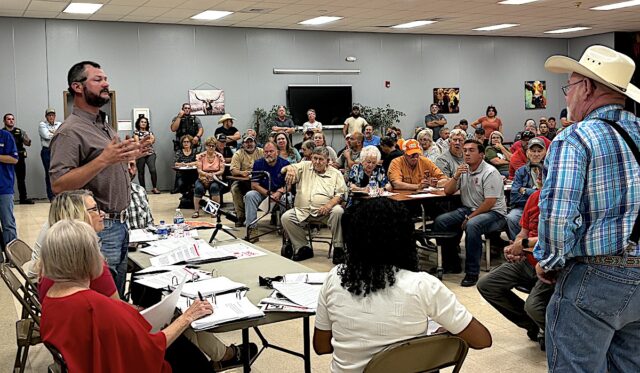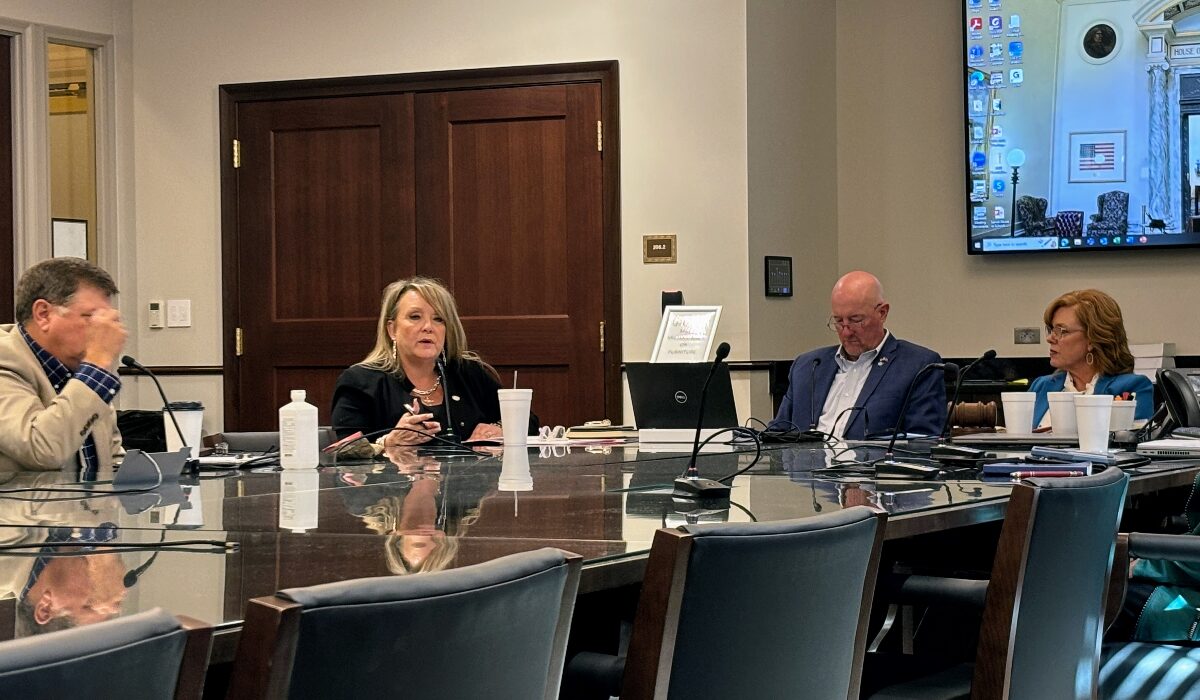
NINNEKAH — Community members left Monday night’s Ninnekah Public Schools board meeting disappointed and irritated over a tax hike arising from the $7.5 million settlement of a lawsuit alleging district leaders failed to stop the decade-long behavior of former girls basketball coach and convicted sexual predator Ronald Gene Akins.
“I think it was crap,” Ninnekah resident Kelly Smith while the board conducted an executive session. “I feel like they didn’t answer questions like they should.”
Upsetting an already frustrated crowd, the board’s president announced there would be only four pre-approved speakers during public comments and that any other citizens would not be recognized by the board. That spurred almost an hour of disorganized conversation, interruptions and high emotions as multiple people attempted to express their frustrations and ask their questions.
Board members told attendees the school’s insurance will cover $1 million of the settlement, while another $500,000 will be taken from the school’s general fund. NPS Board of Education President Brock Perryman said the general fund currently contains $815,000, which means more than half will be used toward the settlement. The depletion barely allows the school to stay operational, according to Perryman, and it still leaves a whopping $6 million owed over three years to 14 victims of Akins’ abuse.
Akins pleaded guilty to three counts of sexual battery, two counts of rape by instrumentation, four counts of lewd or indecent acts to a child under 16 and one count of attempted rape in 2023. Reporting by The Oklahoman shows a pattern of abuse and inaction. In 2015, a girl from a previous school where Akins coached reported abuse to Grady County law enforcement. The investigation never led to charges, and no Title IX investigation was conducted at the previous school, according to the civil lawsuit filed by some of Akins’ victims.
The Ninnekah High School victims alleged that former district Superintendent Todd Bunch, a high school principal, an athletic director and a Title IX coordinator knew about Akins’ sexual misconduct toward the girls he coached, but the lawsuit alleged that they failed to report suspicions of child abuse to law enforcement and the state Department of Human Services as required by law.
The school district denied liability in settling the lawsuit, but Perryman acknowledged during Monday’s meeting that a trial verdict could have held even more severe consequences for the small district just south of Chickasha.
“We basically had an option of this offer or taking it to court,” Perryman said. “That was our decision. If you look at taking it to court, you’re under risk of tens of millions of dollars, which would basically mean bankruptcy. If you look at (…) schools like Kingfisher — $5 million, one student. There’s a town over in eastern Oklahoma — $1.5 million, one student. It was a decision that we felt was sound, where even though it’s going to be tough on the community, it’s tough for three years.”
Lacking funds to pay the full settlement, school board members voted in September to raise property taxes for all property owners within Ninnekah Public Schools boundaries to pay off the remaining $6 million of the settlement. The Grady County assessor told a KFOR reporter that there are 2,235 property owners within the district, all of whom will have around $1,000 in additional property taxes over the next three years.
Ninnekah residents’ consternation over how to pay for a hefty lawsuit settlement is similar to recent frustrations in Kingfisher.
In November 2023, Kingfisher Public Schools agreed to pay $5 million to settle a lawsuit filed by former football player Mason Mecklenburg, who alleged that systemic hazing — which included sexual assault — was ignored by district leaders and even encouraged by a long-time football coach. The settlement set a record for the largest in Oklahoma public school history — until the Ninnekah settlement occurred June 29.
Similar to the Ninnekah settlement, the Kingfisher Times & Free Press reported that KPS agreed to pay $1.25 million from the school’s general fund, and the district will have to pay the remaining $3.75 million over the next three years from its sinking fund, which could necessitate a tax increase.
In Ninnekah on Monday, some attendees claimed the board’s decision to raise property taxes was made without the knowledge of affected property owners. Many attendees of Monday’s meeting agreed there was a lack of communication and transparency when the board was weighing options to pay the remainder of the settlement.
“We know it was hard,” said third-generation resident Alva Charleson. “We were in the dark about the process, about what you were facing, what you were offered, and the community was really not involved in that.”
In response, Perryman told the crowd that, legally, the board members involved in the settlement could not speak to or involve the public in the decision-making process.
“You didn’t give none of us a chance to vote on this,” shouted one community member during public comment. “You took it on your own to raise our taxes. That’s not fair.”
Asked their opinions on the situation during a break Monday night, the board members looked at each other until Russell Thompson broke the silence.
“We’re property owners, too,” Thompson muttered. “We’re right there with them.”
Attorney Cameron Spradling represented the 14 female plaintiffs in Ninnekah and has led numerous lawsuits against Oklahoma school districts that have failed to protect children in accordance with federal Title IX law.
“There’s this common denominator,” he said Wednesday. “They take Title IX money — state and federal funding — and they do nothing with it. They don’t do a goddamn thing with it. What do they do? They think it’s just largesse for their accounts. (…) This guy (Akins), he was the girls’ basketball coach from sixth grade through their senior year. So the amount of grooming, the amount of sexual misconduct, it intensified the number of years you had him (as a coach).”
Spradling offered little compunction Wednesday for Ninnekah residents frustrated with the tax burden.
“I said to my clients, ‘There’s going to be a lot of screaming, but it is what it is.’ My biggest part about this is I wanted this to be a fucking message that just because you are a small school district with 950 people in your town, if you fuck up, you pay just as big as Perry pays or Kingfisher pays or even more,” Spradling said. “And it’s going to hurt bad. But you know what? You voted those fuckers in there. They knew they had Todd Bunch for over 20 years. They knew they had a criminal on their hands, and they didn’t do anything about it. They turned a blind eye to it, and now they whine. That is what gets me.”
Residents burdened by an approved $20 million bond for gymnasium
Spradling, who also represented Mason Mecklenburg for his lawsuit in Kingfisher, said he has noticed a pattern wherein school districts facing litigation over failure to stop misconduct often propose and pass bond projects before settling their lawsuit.
At Monday’s meeting, one woman voiced displeasure with Ninnekah Public Schools doing exactly that.
Ninnekah voters approved a 2023 bond to build a new gymnasium facility to house boys and girls basketball teams and coaches’ offices. The construction of the facility, as well as the district’s bond repayment with property tax revenue, spans more than 10 phases adding up to nearly $20 million.
Although many residents claimed at the meeting they were unaware of the gymnasium proposal, voters approved it with a 76.8 percent majority, although only 228 voters cast ballots on the proposition.
“Many people are upset about the passing of the bond because of a lack of information provided by the school,” said former Ninnekah teacher Judy Bradslat. “Can we push the bond off until this settlement is done so we know where we’re at? Because we didn’t know how much this was going to be. Now we do, and most of us are wondering and concerned about how we’re going to pay this. We don’t want to lose our properties, our homes or our farms because of this.”
Board members did not have a definitive answer to whether delaying the bond could be an attainable solution.
“This is a lose-lose situation here,” Perryman said. “We will look into some other things and see if there’s any other options. Right now, I don’t have all the answers.”
With many ideas thrown around during the meeting, some residents proposed a more drastic measure.
“I just want the school to sell all the assets and be done,” Smith said. “It’s a very dark hole. The kids don’t get the education here that they deserve anyway.”
Smith said the community doesn’t want to see the school shut down, but at this point she believes it’s the best option. With the impending tax hike, Smith said her father could no longer retire.
“And that’s going to be across the board, because this is an older community,” Smith said.
Follow @NonDocMedia on:
Facebook | X | Text or Email
Lawmakers recognize ‘epidemic’ of sexual abuse in schools

On Oct. 1, Rep. Sherrie Conley (R-Newcastle) hosted an interim study — a discussion of policy issues that may be requested by any member of the Senate or House of Representatives — titled Sexual Abuse in Schools: Solutions for Protecting Oklahoma Youth.
Conley told attendees she had started looking into cases of sexual abuse in schools and now has a list of more than 200 names of perpetrators in the state of Oklahoma.
Conley referenced the Ninnekah case when highlighting Oklahoma school districts that have disregarded child sexual abuse.
“If there were 14 young women that came forward, how long had that basketball coach been doing this?” Conley said.
The study featured multiple speakers and presenters, including Ashley Rolen, a survivor of sexual abuse experienced as a Little Axe Public Schools student. Over the years, Rolen has been heavily involved in investigating sexual misconduct within her former school district and advocating for students whose cases went unreported or were ignored by administrative professionals and school boards.
During her presentation, Rolen talked about the traumatic aftermath of her assault, the school’s lack of action, professionals failing to report her case to proper authorities, and the systematic failures that allowed her offenders to go without consequence.
“We need all of you to see that this is an epidemic happening within our school systems and that no child is safe from a sexual predator in the classroom and/or the locker room, from rural to suburban to urban communities,” Rolen said. “There are pedophiles being passed around Oklahoma, all in an effort to save face for a school district, rather than being pulled from our school system and turned over to the police to protect children and hold people accountable. This is not a game.”
Rolen finished her presentation by urging legislators to change Oklahoma law to make the prosecution of sexual predators easier and to encourage a “safe place for survivors to come forward.”
Following Rolen, attendees heard from Ryan Stephenson, assistant executive coordinator for the District Attorneys Council, along with Adam Panter and Lori McConnell, the district attorney and assistant district attorney for Lincoln and Pottawatomie counties. The legal professionals presented a case study on former Shawnee Public Schools coach Ron Arthur, who was sentenced to five years in prison in February 2024 for a felony charge of soliciting sex from a minor by use of technology.
Arthur began his education career in 1993 and taught at three different Oklahoma school districts where he faced multiple internal school investigations into his alleged sexual misconduct. Although multiple students came forward and alleged abuse from Arthur over the span of almost three decades, Arthur was not reported to the authorities and faced no consequence from the school districts or the state board, McConnell said.
“I believe that there’s a lack of accountability, and this is absolutely true through the school’s records, which, as I’ve mentioned, are very replete of all the people who knew about what’s happening,” McConnell said. “In Ronald Arthur’s case, I can name off the top of my head 10 names of people who knew what was happening and did nothing about it.”
After going through each current Oklahoma state statute regarding sexual abuse in schools, Stephenson suggested three legislative actions that could mitigate sexual abuse in schools:
- Expanding the statute of limitations for the prosecution of willfully failing to report child abuse;
- Requiring mandatory reporting between law enforcement and the Department of Human Services; and
- Clarifying the definitions included in the safety zone violation statutes.
Conley closed the study by urging the public to do right by child victims of sexual abuse, and she again referenced the Ninnekah settlement as an incentive for Oklahomans to combat the issue.
“We’ve got to stop thinking about the perpetrator and start thinking about the victims here,” Conley said. “If you don’t want to think about the victimization of children, go to what it’s doing to our taxpayers and our constituents. That the money now is being put on the backs of those community members.”






















